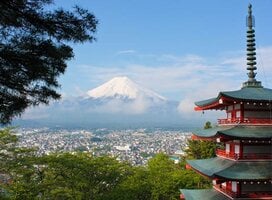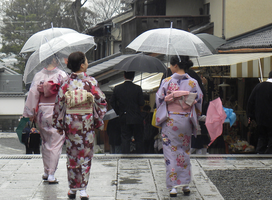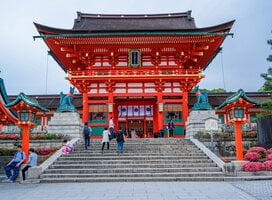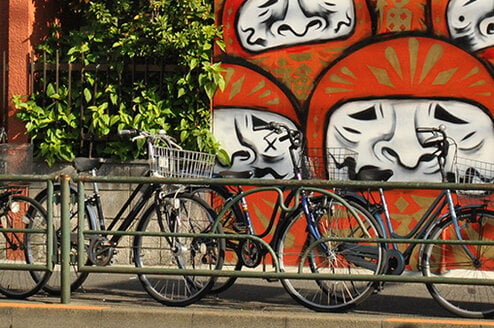Teach English in Kyoto, Japan
Japan is one of the top destinations for expats who travel abroad to teach English. Decent salaries, a modern society, and opportunities to explore traditional Japanese culture make it attractive to many individuals. For teachers who want to delve more into the traditional roots of Japanese culture and step away a little from the hyperkinetic lifestyle of Tokyo and Osaka, Kyoto is the perfect location.
Teach in Kyoto to experience the tranquil beauty of one of Japan’s loveliest cultural cornerstones. Likely the birthplace of most romanticized ideas of Japan, Kyoto attracts thousands of visitors every year with its floating temples, raked pebble gardens, imperial gardens and peaceful blue lakes. Home to more than 2,000 Buddhist temples and 400 Shinto shrines, Kyoto is a mecca for wanderers, pilgrims and those seeking traditional Japanese culture.
Government Sponsored Programs
The JET Programme applies to the whole country of Japan. While Kyoto may not be the hotspot that Tokyo is, there is still a possibility to request to be placed in Kyoto and the rest of the Kansai region.
The JET Programme is an initiative of the Japanese government, especially the Ministry of Foreign Affairs, to promote global relationships with other countries. You can apply to be an ALT (Assistant Language Teacher) and JET places people all over Japan. They typically begin recruiting in September, and the application process can be long and very competitive. A Bachelor’s degree is required, and for potential ALTs, a teaching credential and teaching experience is preferred.
Private Language Academies/Schools:
There are branches of the large chain schools, such as AEON, in Kyoto and the Kansai region. These schools tend to hire year-round, depending on the demand for English teachers. Students can be children who are attending after their regular school, or adults who wish to learn English for business or for their own knowledge. The private chain schools usually provide excellent benefits for their teachers, such as housing or airfare reimbursement.
Universities
Kyoto is an academic center in Japan. There are at least 37 universities in Kyoto, and Kyoto University is perhaps one of the most renowned. Some American universities, such as Stanford University, operate education centers and opportunities for American students to learn more about Japanese culture.
It is possible for English teachers to get a job in a university in Japan. They hire at least four to six months before the beginning of a new semester, and semesters begin in April and in October.
Japanese universities prefer their teachers to have Master’s degrees, as well as teaching experience. Some universities would like their teachers to have some basic command of Japanese. This type of teaching job is not easy to get, but if you have been teaching in the private or public school system of Japan for a while and you wish to move up to a university position, it may be easier for you because of the contacts you have made as a teacher already.
Private Tutoring:
English teachers can make extra money as private tutors. Depending on the number of students, the location, and the demand for your services, you can make as much as $19 to $44 USD an hour.
However, please remember to look at your contract before you start advertising yourself as an English tutor. Most contracts put in a clause prohibiting their teachers from taking on private students. Teachers are also not allowed to privately tutor students from their own school. But as long as the teacher practices discretion, it is possible to earn some money and enjoy scheduling flexibility as a private tutor.
When and Where to Look for Jobs:
Public and private schools tend to hire in March and April, and again in August, around the beginning of their school semesters. English teachers may want to apply at least four to six months before the beginning of a school semester. For private language schools, jobs can be found year-round. It is possible to come to Japan on a tourist visa and switch to a work visa, if the teacher wants to come and look for work in Japan. However, it is also possible to secure a job from the teacher’s home country.
Teachers can search websites such as Gaijin Pot, Ohayo Sensei or our own Go Overseas Job Board for teaching jobs. Some websites that are recommended for specifically targeting the job search on Kyoto and the Kansai region are Kansai Scene Magazine and Kansai Flea Market.
Qualifications:
Due to visa requirements, teachers should have at least a Bachelor’s degree. The JET Programme has its own qualifications, including teaching credentials and experience. University teachers should have a Master’s degree, teaching experience, and basic competency in Japanese. Make sure you do your research when you are job searching to make sure you have the proper qualifications before applying.
Kyoto Highlights
For over one thousand years, Kyoto was the imperial capital of Japan, and it has held on to its ancient legacy in the form of well-preserved temples, shrines, palaces and gardens. With over one thousand Buddhist temples, 400 Shinto shrines, and several ancient monuments designated as World Heritage sites by UNESCO, tourism is a huge business in Kyoto, welcoming school groups across Japan and foreign tourists as well. Kyoto is also the center of the Japanese film industry, as well as home to the headquarters of several international businesses such as Nintendo.
For English teachers who also want to take home traditional Japanese handicraft as souvenirs, Kyoto is the place to be, where making kimonos is still a craft that is practiced. Finally, festivals that are celebrated in Kyoto are well-known all over the world, such as the Gozan no Okuribi, which marks the Bon Festival with torches and fires lit on the mountains to guide ancestral spirits to their homes.
It’s also easy to take the train from Kyoto into Osaka, if you want to get a more active nightlife. But if you want a slower pace and you want to be surrounded by history and gorgeous scenery, Kyoto may be the place for you to teach English. However, be prepared to do your research and to really hunt and ask questions. The job market in Kyoto is not quite as extensive as it is in Tokyo or Osaka. However, that might be an advantage to an English teacher, who would rather be a “big fish in a small pond!”
Salary & Cost of Living:
Most of the time, English teachers in Kyoto take home a salary ranging from US$2000 to US$2500 a month. Kyoto is considered to be less expensive than Tokyo, so your money can go further here. Also, because the Japanese yen is currently strong, it is easy to use your money to travel around Japan and beyond. Kyoto is less than an hour’s train ride from the active nightlife in Osaka. Keep in mind: the cost of living in Kyoto may be lower, but so is the demand for English teachers, and so is the salary.
When it comes to finding housing, most employers do have apartments set aside for their teachers, where they will pay a small amount of rent each month. If you want to find your own accommodation, keep in mind that renting is different in Japan than it is in the United States. Tenants of apartments in Japan have to put down a pretty hefty deposit, called key money, prior to moving in.
Another thing to bear in mind is apartments in Japan are smaller than what you may be accustomed to in the Western countries. Kansai Flea Market is a great resource for looking at apartments, as well as for furniture and items that expats may be leaving behind.
Rents can be anywhere from US$390 to US$1000, depending on the size of the apartment and the area where it is located. Remember that lower rent may be found in older buildings, which may not have Western-style toilets. Some expats living in Kyoto seem to like the area near Kyoto Station, which is the transportation hub of the area and has lots of shopping. The Fushimi area is also popular for young families and is relatively inexpensive.
Kyoto is a city that is filled with delicious local food. It is well-known for tofu and vegetarian dishes, and sushi. If you eat out, a meal can cost you anywhere from US$10-US$40 per person. For a real dining experience, you can go to a high-end restaurant, where maikos, or apprentice geishas, entertain dining guests with traditional Japanese games, dancing, and other activities. This is very expensive, US$176 per person, but it can be quite an experience. There are several blogs, such as Follow Me Foodie's post on food in Kyoto which can tell you more about Kyoto cuisine.
Classroom & Work Culture
It is best to always pay attention to your co-workers at the school you are working at, because they will tell you how best to behave and dress during your time in Kyoto. It is generally believed that the people in Kyoto are a little quieter and more reserved in their behavior than their counterparts in Tokyo and Osaka.
Because there are many temples and shrines in Kyoto, if you are visiting one, remember to take off your shoes and place them neatly to the side before entering a temple, shrine, or a house. Make sure you are quiet when visiting temples and shrines, or even when just observing them, because the worshippers live nearby.
At work, most Japanese tend to dress conservatively. Private language schools, such as AEON, do have a business/business casual dress code. As always, follow the example of your co-workers. Students will also dress conservatively in the classroom.
Japanese students show a great deal of respect for their teachers, but they are uncomfortable with being singled out as a great achiever or as someone who is struggling in the class. In fact, some students will say they understand something, even if they do not, as a way of “saving face.” Rather than asking "do you understand" try asking questions that elicit information answers, not yes/no answers.
Despite their conservative nature, the Japanese are willing to help a Westerner learn their way through culture and etiquette. They do not expect you to know everything, so when in doubt, ask for help.
Contributed by Whitney Zahar
Teaching Programs in Kyoto
What People Are Saying
New Teaching Jobs
View the latest teaching job postings on our job board.
Related Teach Abroad Articles
Frequently Asked Questions
-
Do I need to know Japanese to teach English in Japan?
You don't need to be fluent or know how to speak Japanese to teach English in Japan. In fact, many of the teaching programs offer free Japanese lessons for teachers.
Related Content -
How long can you teach English in Japan?
The length of time you are able to teach in Japan will depend on the visa you receive. Work visas in Japan can be for lengths between 4 months to 5 years and can be extended.
Related Content -
What are the requirements for teaching English in Japan?
Requirements will depend on the school you are hoping to work with, but most programs will require a Bachelor's degree and a clean criminal record. Some may also require a TEFL certification.
Related Content -
Can I teach in Japan without a degree?
Most schools in Japan will require teachers to have a Bachelor's degree, and some may also require TEFL certification.
Related Content -
Are English teachers in demand in Japan?
English teachers are in high demand in Japan, especially native speakers or speakers with native-level fluency.
Related Content -
What is the average salary for teaching English in Japan?
As an English teacher in Japan, you can expect to earn anywhere between $1,700-$5,000 per month, depending on the type of school you're in.
Related Content -
How do I start teaching English in Japan?
When considering teaching English in Japan, you'll want to consider where you want to be located, what type of school you want to teach in, and what age group you're hoping to work with. You can then begin applying to jobs through job boards, recruitment organizations, or by directly applying to specific schools. Start by checking out the Go Overseas Job Board!
Related Content














